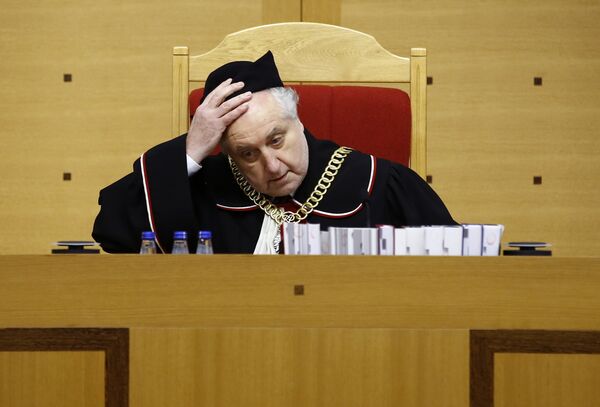In December 2015, the Polish Government added five "politically friendly" judges to the country's Constitutional Tribunal, in a move seen by critics as making it easier to push through legislation with less opposition.
The amendment meant that the tribunal would need a two-thirds majority to take a decision on constitutional matters instead of a simple majority. The minimum number of judges needed to make a decision was also raised from nine to 13, making it more difficult to convene a quorum.
The changes stated that there should be a six-month period before the tribunal can examine a case, rather than two weeks, which critics say allows the government to pass legislation that will go unchallenged for months.
However, Chief Justice Andrzej Rzeplinski last week ruled that many sections of the law passed in December 2015 were "non-compliant with the Polish Constitution. [The law] prevents the honest and proper functioning of the… Constitutional Court, by interfering in its independence and separation from other powers, thus violating the principles of the rule of law."

The government in Warsaw said it would ignore the ruling, refusing to publish it. Under the Polish constitution a ruling does not become final until officially published.
Urgent Course Change
Nils Muiznieks, the Council of Europe Commissioner for Human Rights, told reporters:
"Recent far-reaching changes to Poland's legal and institutional framework threaten human rights and undermine the rule of law, on which the protection of human rights ultimately depends. Lawmakers and the Government should urgently change course."
The Commissioner said he was particularly concerned by the prolonged paralysis of the Constitutional Tribunal which "bears heavy consequences for the human rights protection of all Polish citizens and prevents human rights proofing of legislation." He called on the Polish authorities to urgently find a way out of the current deadlock, stressing that "the rule of law requires that any solution be based on respect for and full implementation of the judgments of the Tribunal."
Erosion of rule of law threatens human rights protection in #Polandhttps://t.co/XIyHFbGp7k pic.twitter.com/1ZmQILUWVX
— Nils Muiznieks (@CommissionerHR) 15 June 2016
The Polish Government in December 2015 also passed legislation, allowing ministers to appoint the heads of state radio and TV stations, in a move widely criticized as suppression of media independence.
"Putting public television and radio under the direct control of the government runs contrary to Council of Europe standards on media freedom," said the Commissioner.



